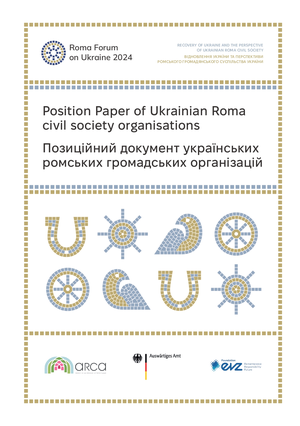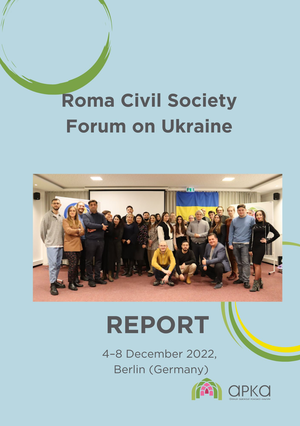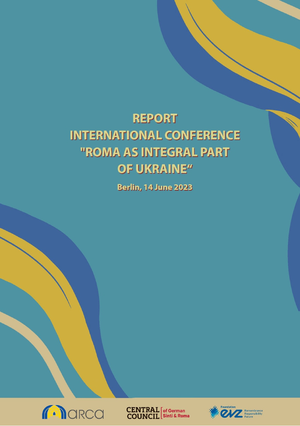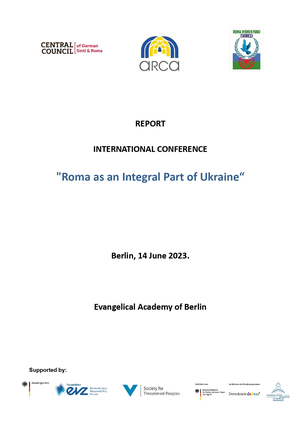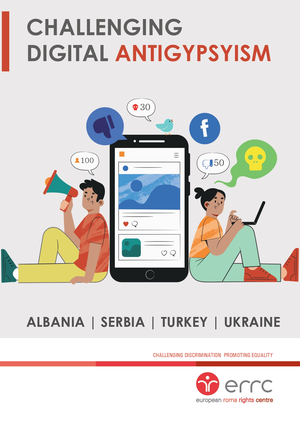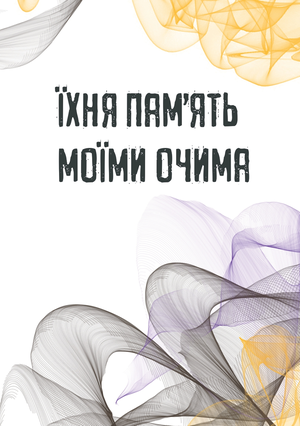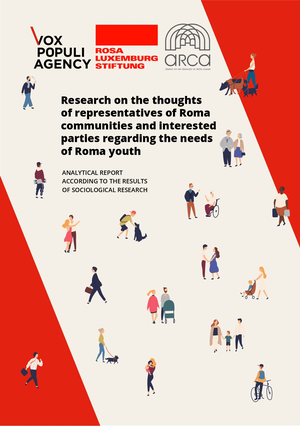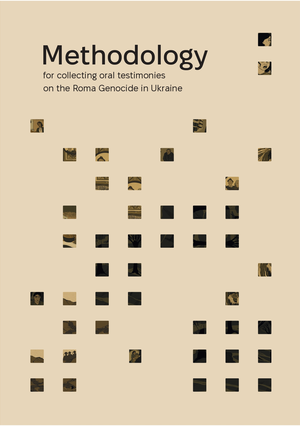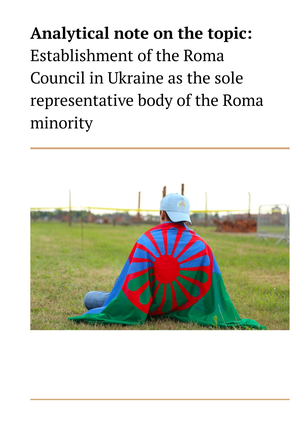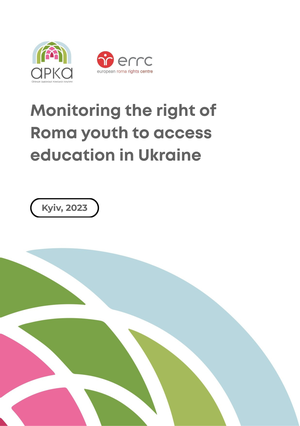Analytical materials
Position Paper of Ukrainian Roma civil society organisations
This position paper was prepared ahead of the conference “Reconstruction of Ukraine and Prospects for Ukrainian Roma Civil Society,” which took place in Kyiv on October 30, 2024.
The purpose of this position paper is to inform the Ukrainian government and the international community about the needs of Roma in Ukraine and to provide recommendations on how these needs and their rights can best be met within the framework of Ukraine's recovery and the process of Ukraine's accession to the European Union.
This position paper is based on the results of fruitful discussions during the International Conference “Roma as an Integral Part of Ukrainian Society,” organized in June 2023 in Berlin, Germany, as well as on the position paper presented at that conference.
Roma Civil Society Forum on Ukraine
Russia's full-scale aggression against Ukraine in February 2022 changed all plans, significantly reduced opportunities, and put the Roma community on the verge of survival. Some activists ended up in the occupation, some moved to other, safer regions of the country, and some went abroad. Established connections were broken, some organizations and initiatives stopped their work, and public activists faced unexpected risks.
The idea of holding the Roma Civil Society Forum on Ukraine in Berlin (Germany) was the answer to all these challenges. The Forum run from the 4th to 8th of December 2022 and became a platform for youth, experts and artists of the Roma movement from Ukraine and other European countries involved in helping Roma from Ukraine.
Key representatives of Roma and (pro-)Roma civil society, politicians and various stakeholders gathered to create a coalition that will strengthen the equality, integration and participation of Ukrainian Roma in the European context. The Forum promotes European and national policies to be more inclusive and responsive to the current needs of the Ukrainian Roma.
Report on the results of the conference “Roma as an integral part of Ukraine”
The conference “Roma as an Integral Part of Ukraine” took place on June 13, 2023 and was organized by the Central Council of German Sinti and Roma and the Roma Youth Organization ‘ARKA’ from Ukraine in cooperation with the Evangelical Academy in Berlin, the Society for the Assistance of Peoples in Danger (Germany) and the International Charitable Organization “Roma Women's Fund ”Chiricli" (Ukraine).
The purpose of the conference was to raise awareness of the situation and needs of Roma in Ukraine and to inform representatives of governments, embassies, international organizations and civil society about these needs.
Fifteen representatives of the Roma community from Ukraine had the opportunity to participate in the conference and convey their position and demands to a wider audience of representatives of governments, embassies, international organizations and civil society. They also had the opportunity to present a policy document with clear recommendations for the Ukrainian government and the international community, which was developed prior to the conference.
Report international conference "Roma as an Integral Part of Ukraine“
The intention was to raise more awareness on the situation and the needs of Roma in Ukraine and inform representatives of governments, embassies, international organisations and civil society about these needs.
Already in September 2022, the Chairman of the Central CounciI of German Sinti and Roma met with the Foreign Minister of Germany, Ms. Annalena Baerbock to discuss the need to pay particular attention to the situation of Roma in Ukraine. We highly appreciate the support we receive since then from the Federal Foreign Office of Germany.
The conference was another step in the efforts of the Central Council of the German Sinti and Roma in cooperation with the Roma civil society from Ukraine to raise awareness on their needs and to strengthen their participation in decision-making processes affecting them.
Challenging digital antigypsyism
This report was produced by participants of the ERRC’s volunteer-led project Challenging Digital Antigypsyism.
The volunteers, who formed digital activist communities, were tasked with monitoring and recording examples of hate speech targeting Roma on online media and social networks, and reporting this hate speech by using available tools on each platform. The reporting took place in four non-EU countries: Albania, Serbia, Turkey, and Ukraine, and was conducted between November 2020 and August 2021.
More generally, there is widening concern about the spread and consequences of unchecked hate. According to a recent European Parliament (EP) study, hate speech and hate crime ‘poison society’ and have been steadily on the rise over the last decade; hate speech has surfaced at the “highest level of the public administration of some Member States”.
The EP report noted how hate speech has become especially prevalent on social media, where both political actors and citizens “express their thoughts without inhibition”, and how attempts to regulate hate speech on social media so far have brought ambiguous effect.
Their memory through my eyes
The history of wars usually focuses on battles, heroes, and political decisions. But behind these events are often lost the personal stories of ordinary people, including children who survived the occupation. Their experiences, especially those of vulnerable groups such as the Roma, have long remained invisible and did not fit into official narratives. This document is an attempt to restore the voice of Roma children who were victims of genocide during World War II. Through their testimonies, we can see history from a new angle and restore the silenced pages of the past.
Research on the needs of Roma youth
The purpose of the research is to develop recommendations for representatives of public authorities and local self-government bodies to involve representatives of Roma
communities in youth support programmes at the local level.
Research objectives: To determine the list of needs of Roma youth, as well as to investigate the difference between the needs of young people living in a dispersed and compact way; To investigate the awareness and involvement of Roma youth in projects or initiatives implemented for young people at the local level – opportunities for integration into these projects; To study the ways of leisure of Roma youth, the circle of communication and the circle of authoritative people whose opinions are listened to; To investigate the awareness of the needs of Roma youth among the surveyed groups.
Methodology for collecting oral testimonies on the Roma Genocide in Ukraine
This analytical material is devoted to the topic of collecting oral testimonies from Roma who survived genocide during World War II. The document examines in detail why this work is important today—due to the limited number of living witnesses who can personally recount their experiences, as well as the fact that the memory of the Roma genocide remains understudied and often invisible in public narratives.
Collecting such testimonies requires a high degree of ethics, sensitivity, and a willingness to work with people who carry deep intergenerational trauma. The authors emphasize that it is important not only to record the facts, but also to preserve human dignity, build trust, and take into account the cultural characteristics of Roma communities.
Establishment of the Roma Council. Analytical note
It is important to promote a positive narrative about Roma and perceive them as an integral part of Ukraine. The first steps in this direction have already been taken, but in a country fighting an aggressor, and at a time when negative stories spread quickly through social media, it is extremely important that politicians and society value vulnerable minorities such as Roma as an integral part of the country.
Roma consider themselves an integral part of Ukraine, as evidenced by the large number of Roma fighting in the Armed Forces of Ukraine, as well as other activities of Roma in Ukraine that support the fight against the aggressor.
Therefore, given this and Ukraine's desire to take its place in the European Union, there is now a good opportunity to create a single representative body for the Roma community. This report is not an instruction manual, but rather a set of recommendations that can serve as a guide for the self-organisation of the Roma community in Ukraine.
Monitoring the right of Roma youth to access education in Ukraine
In order to initiate a dialogue in society aimed at solving the problem of Roma youth's access to the right to education, a group of activists from the Roma youth organization ARСA launched this study, “Monitoring the implementation of Roma youth's right to education in Ukraine,” the results of which are presented in this report. The authors were the young people themselves, and the study was combined with training and learning through action. The information gathered, conclusions, and recommendations represent the voice of Roma youth and their opinion on the implementation of urgent measures to support Roma children and youth in their aspirations to obtain an education.
